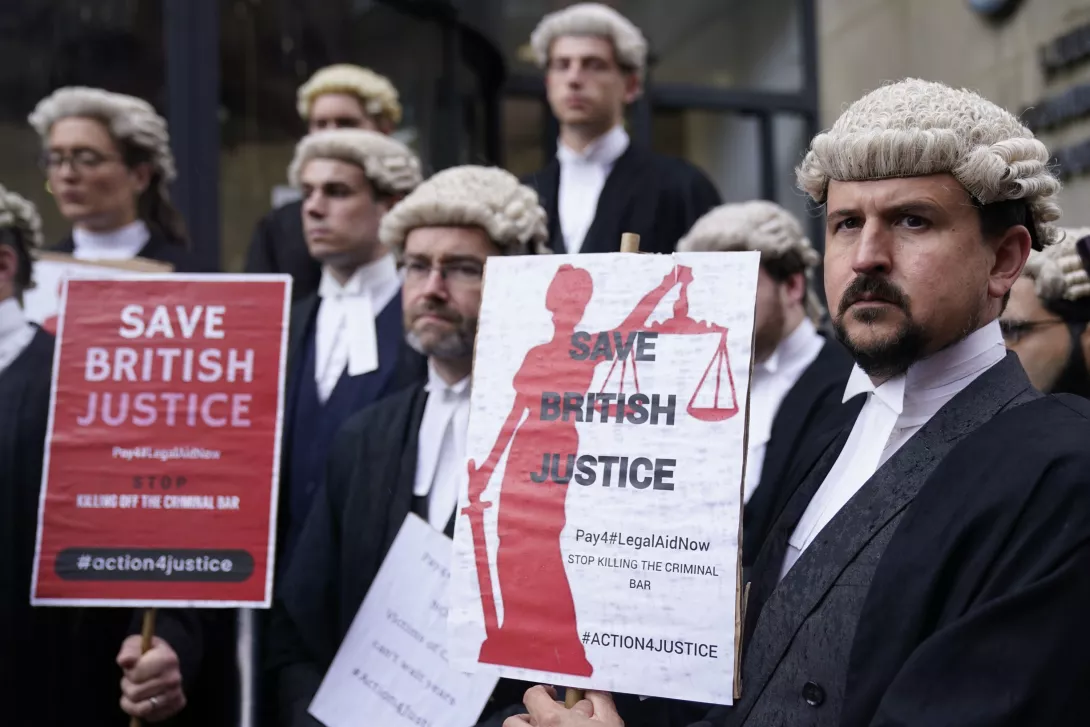Error message
An error occurred while searching, try again later.
IN Saturday’s edition of the paper, I examined the drastic cuts to legal aid since 2012 in the context of the crisis in public finances. I suggested that in practical terms the problem is how necessary legal services can be provided to those unable to afford them without further help from the Treasury.
I noted that in theory, the legal aid scheme is supposedly now a competitive market system “based on quality, capacity and price,” administered by a government quango, the Legal Aid Agency.
This has resulted in considerable over-regulation of legal services. The result has been that legal aid firms spend a great deal of each week maintaining unnecessarily complex management and recording systems rather than helping clients.
The Legal Aid Agency now spends over £90 million a year administering the phenomenally over-complicated system it has created. On top of this, the Legal Services Board Budget is £5m and that of the Office for Legal Complaints £18m, while the Solicitors Regulation Authority’s is £157m. That all comes to more than a quarter of a billion pounds a year spent on legal quangos.
This approach has its origins in the 1980s. Thatcher took the view that the professions were self-serving and could not be trusted to promote the public interest.
That was misguided. For centuries the professions had, on the whole, successfully developed appropriate ethical practice frameworks and supervised their members for the benefit of clients and patients at no public expense. Public oversight can be provided by holding meetings in public and some lay representation on committees.
The Law Society should be invited by the Ministry of Justice to undertake a comprehensive review of legal aid and to put forward (if appropriate) a new system whereby it again assumes responsibility for these functions, with the savings being applied to the courts and legal aid Budgets.
The Law Society should also be tasked with reviewing the unnecessarily complicated, long-drawn-out and expensive procedural formalities of our courts. The bar has many strengths and virtues but also a great weakness for excessive formality, forms and rules. It and barrister judges have created a monster and their own periodic attempts at reform have simply resulted in more paper and expense.
The court I sat in — the Court of Protection — is a perfect example. Its procedures could hardly be more labyrinthine and cumbersome. Many solicitors and service-users went to a great deal of effort to produce a Mental Capacity Act that was wafer-thin and easy to understand, in particular by people with impaired capacity and their families.
That simple Act has spawned a standard textbook (the “blue book”) that contains 3,000 pages of court rules, regulations, practice directions, orders, statutory forms, case law guidance, codes of practice and other relevant material.
This all builds huge unnecessary delays and costs into the system because of the need for applicants and parties to comply with all these manifold requirements. Under the present senior judge, there are 67 per cent more orders per case than in 2017, amounting in total to an extra 16,766 orders, but the same number of final orders.
Significant savings can therefore be made by simplifying and shortening legal procedures and this money released for legal aid and investing in courts and tribunals. This will only work if for once solicitors are put in charge of the process.
That is the savings side. How, in addition, can extra money be generated for legal aid and assistance if nothing more can be expected from general taxation? New thinking is required and is preferable to otherwise inevitable decline. The following ideas need to be examined critically and then accepted, accepted in part — or rejected.
The original post-war legal aid rates were set at 10 per cent below the private fees charged by solicitors. This 10 per cent reduction represented the solicitor’s own charitable contribution to the scheme. The hourly rates now are probably 50-75 per cent below private rates.
In other words, half to three-quarters of the work done by legal aid solicitors is done pro bono. As a result, an ever-decreasing number of heroic individuals dedicate themselves to legal aid work and serving the less well-off, foregoing the salaries and perks of private practice.
All members of the legal profession should share some of this burden, as their own contribution to our justice system. A 5 per cent legal aid levy should be added to all private legal bills.
Firms can either reduce their fee by this amount or, if they must, pass the cost on to their client. To put this in context, in 2023 legal activities generated £47bn in revenue and Freshfields Bruckhaus Deringer’s profit per equity partner was over £2m.
It is then necessary to consider whether government departments should fund, by transfer to the Ministry of Justice, part of the public cost of litigation caused by their new legislation. This would be a useful discipline for them and a brake on unnecessary legislation.
When I commenced practice in the mid-1980s, the legal aid fund sometimes made a profit from personal injury cases. These days, private “no win no fee” agreements for personal injury work allow a sizeable success fee to be paid to the claimant’s solicitor from the damages awarded, over and above the usual hourly fees.
Provided the case has a high chance of success and the defendant has the means to pay, it makes sense for the legal aid body to fund personal injury and other civil litigation on a similar success fee basis, which would generate income for other legal aid cases.
Nor is there a particularly good reason why a losing defendant should not pay the legal aid body costs at a standard private rate, albeit the claimant’s legal aid solicitor only receives part of the costs awarded, with the balance retained to fund other cases.
There is often a disturbing inequality of arms in legal proceedings. Public authorities are invariably legally represented at considerable expense from public funds — which is a form of non-means-tested legal aid under another name — while the citizen, with no or limited means, is ineligible for state-funded representation.
A judge should be able to direct the public authority to fund the individual’s representation up to a stated amount, subject to an interests of justice test. Both parties share this pool of public funding.
The next question is: are there other ways in which legal services can be provided at reasonable cost outside the conventional legal aid framework, thereby reducing the demand on the legal aid fund?
An area ripe for reform is legal expenses insurance. Travel, car, buildings and contents insurance and credit cards often include legal cover for fees up to £50,000. It may be desirable that the inclusion of such cover is made compulsory and the terms of the cover standardised by the government.
Another idea, which I have long espoused, is that multidisciplinary community mental health teams funded by the DHSC should include a legal aid lawyer. It is often critical to recovery that people experiencing significant mental health problems are able to resolve the many legal problems caused by their episodes of illness.
Further possibilities are salaried legal aid services under the aegis of the Law Society; government bursaries in place of crippling student loans, in return for a commitment to undertake two or more years of legal aid service; and a professional duty on firms that do not have a legal aid contract to undertake some pro bono work each year for a legal aid firm.
Many of these proposals will infuriate the press, who will retaliate with absurd attacks on “fat cat lawyers” milking legal aid. That is to be expected. Our newspapers have mostly been bought by foreign-domiciled owners to further their own corporate and tax interests, not to further a fair welfare state or fair reporting.
Anselm Eldergill was a judge. He is a solicitor, an associate at Doughty Street Chambers and an honorary professor at University College London. He is also a member of the Co-operative Party. In 2019 he received a special lifetime Legal Aid Lawyer of the Year Award.










